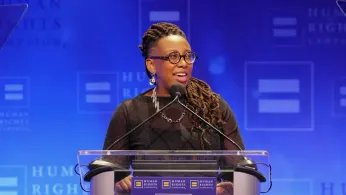
5 hours ago
Kelley Robinson’s Vision: Human Rights Campaign President Confronts Political Backlash and Champions LGBTQ+ Advocacy
READ TIME: 4 MIN.
Kelley Robinson, the first queer Black woman to lead the Human Rights Campaign (HRC), has emerged as a prominent voice in American LGBTQ+ advocacy during a period marked by political turbulence and rising extremism. In her recent interview with The Advocate, Robinson reflected on the evolving landscape of equal rights, the strategies necessary to counter regressive policies, and the centrality of storytelling in mobilizing communities nationwide. Her leadership comes at a time when the LGBTQ+ movement faces renewed threats, especially from conservative administrations seeking to roll back protections and sow division.
Robinson joined HRC in late 2022, making history as the organization’s first queer Black woman president. Her professional trajectory began in political organizing for Barack Obama’s presidential campaign and continued through key roles at Planned Parenthood, where she expanded the Action Fund’s supporter base from 6.5 million to 18 million through robust outreach and advocacy. At HRC, Robinson has prioritized intersectionality, focusing on issues such as voting rights, reproductive justice, living wages, and healthcare access, with a strong commitment to the voices of marginalized and impoverished communities.
During her tenure, Robinson has testified before Congress about the rise of anti-LGBTQ+ extremism and violence, underscoring the urgency of legislative and community-based responses to protect vulnerable populations. Her advocacy is informed not only by her professional experience but by her personal journey as a wife, mother, and Catholic, bringing a deeply empathetic approach to her work.
In her interview with The Advocate, Robinson addressed the challenges posed by the current conservative administration, led by former President Donald Trump. She described the era as one of heightened backlash, noting that attacks on LGBTQ+ rights are a direct reaction to the progress made over decades. Robinson characterized the movement’s resilience: “We have always been here and we are not going anywhere,” she stated, highlighting the enduring presence and contributions of lesbian, gay, bisexual, transgender, and queer people in American society.
Robinson outlined a multi-pronged approach to advocacy in this climate:
- Separating Fact from Fiction: HRC is working to provide clear guidance on existing protections, helping employers, workers, parents, and students understand their rights under federal law—such as Title VII, which prohibits discrimination based on sexual orientation and gender identity.
- Lifting Up Stories: The organization is amplifying the lived experiences of LGBTQ+ people, especially in red states, using storytelling to build empathy and counter misrepresentation.
- Litigation and Policy Advocacy: Robinson confirmed that HRC is taking legal action against discriminatory policies, including recent lawsuits targeting the administration’s transgender military ban.
- Corporate and Legislative Engagement: HRC collaborates with corporate leaders to defend diversity, equity, and inclusion initiatives. At the 2025 National Dinner, Robinson celebrated over 600 corporate leaders and political allies, including the Equality 100 Awards, emphasizing the need for courage and partnership in defending LGBTQ+ rights.
Robinson’s optimism is rooted in historical perspective. She referenced the “Lavender Scare” of the 1980s and the multi-million-dollar campaigns against marriage equality in the 1990s, pointing out that today, two out gay cabinet members have served and marriage equality is the law of the land. Robinson herself is married and highlights the normalization and celebration of LGBTQ+ families as a sign of enduring progress.
Central to Robinson’s strategy is the power of storytelling. She believes that sharing authentic stories from diverse LGBTQ+ communities can reshape public opinion, combat stigma, and mobilize allies. In the interview, Robinson emphasized reaching out to both red and blue states, recognizing that lived experiences in conservative regions are often overlooked. By amplifying voices from every corner of the country, HRC aims to counter efforts to scapegoat or marginalize LGBTQ+ people.
Robinson stated, “We will not be your scapegoat, we will not be your wedge issue, and we will certainly not be your moral panic,” underscoring her determination to resist efforts to exploit LGBTQ+ rights for political gain.
Robinson’s leadership is informed by her personal identity and experiences. She reflects on her Catholic faith, her marriage to Becky George, and her role as a mother, using these touchstones to connect with communities that may feel alienated from mainstream advocacy. In her conversation with The Advocate, she discussed the importance of finding common ground and fostering empathy across political and cultural divides.
Robinson also foregrounds intersectionality, recognizing that the fight for LGBTQ+ rights is inseparable from broader movements for racial, reproductive, and economic justice. She insists that protecting LGBTQ+ people means defending human rights for all, noting, “These are not special rights; these are human rights. And when we protect these rights, every single person wins”.
Looking forward, Robinson and HRC are preparing for the 2026 midterm elections, aiming to regain legislative ground and reinforce protections for LGBTQ+ people nationwide. Robinson called for renewed engagement with corporate America, educational institutions, and grassroots organizations to ensure progress is not reversed.
Her message to supporters is one of hope and agency: “We are not without hope and we are certainly not without power. It’s time that we own that power”.
Kelley Robinson’s interview with The Advocate highlights the evolving strategies and enduring resilience of the LGBTQ+ movement. Through intersectional advocacy, legal action, and the amplification of community stories, Robinson aims to safeguard recent gains and forge new paths toward equality. Her leadership affirms the intrinsic role of LGBTQ+ advocacy in American history and the necessity of solidarity in confronting contemporary challenges.
As Robinson and HRC continue their work, the fight for equal rights remains central to the broader quest for justice and dignity for all people.






